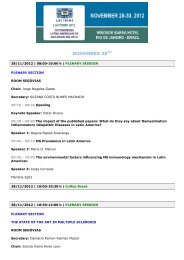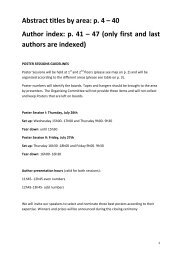Keynote Conference - Interevent
Keynote Conference - Interevent
Keynote Conference - Interevent
Create successful ePaper yourself
Turn your PDF publications into a flip-book with our unique Google optimized e-Paper software.
Symp#31 Cancer Stemness -Taiwan Cell Biology Society<br />
Chair Ken Wu<br />
Tariq Enver<br />
Stem Cell Laboratory, UCL Cancer Institute, University College London, London, UK<br />
Relapses after therapy-induced complete clinical remissions remain the most significant challenge in cancer therapy. This suggests<br />
that a proportion of cancer cells at presentation, escape therapy and persist during remission. These cells presumably are the source<br />
of relapse. Why are these cells chemoresistant? We argue that the answer lies in a combination of genetic and epigenetic<br />
heterogeneity acting to some degree at the level of 'cancer stem' or 'tumour propagating' cells. We have obtained evidence in<br />
support of this conceptual framework for cancer resistance in the context or childhood ALL, the commonest cancer of children. Our<br />
results encourage a re-positioning of the cancer stem cell concept as it relates to disease in patients.<br />
SOX2 promotes lung cancer stemness by inducing EGFR and BCL2L1 expression<br />
Cheng-Wen Wu<br />
Institute of Biomedical Sciences, Academia Sinica; and Program in Molecular Medicine, National Yang-Ming University, Taipei,<br />
Taiwan, ROC.<br />
Tumor cells have long been observed to share several biological characteristics with normal stem/progenitor cells; however, the<br />
molecular mechanisms eliciting cancer stemness features in tumors remain elusive. SOX2 is a key regulator for maintaining stemness<br />
properties in lung progenitor cells. Here we report the discovery and involvement of SOX2 in the development of lung cancer<br />
stemness. SOX2 expression was associated with poor prognosis of lung cancer patients. SOX2 was expressed in a subclass of lung<br />
cancer cells, the self-renewal and proliferation of which was dependent on SOX2 signaling. SOX2 induced EGFR expression via binding<br />
to the EGFR promoter, and EGFR activation further upregulated SOX2 levels, forming a positive feedback loop. SOX2 overexpression<br />
promoted chemoresistance, and SOX2 silencing perturbed mitochondrial integrity with marked apoptosis and autophagy. SOX2<br />
induced BCL2L1 expression through binding its promoter. Ectopic BCL2L1 expression rescued SOX2 silencing–induced apoptosis,<br />
autophagy, and mitochondrial abnormality. SOX2 overexpression induced tumor formation, and SOX2 knockdown attenuated tumor<br />
growth in a xenograft mouse model. SOX2, EGFR and BCL2L1 expression was significantly correlated in primary lung tumors. These<br />
data support the critical role of SOX2 in the development of lung cancer stemness via activation of EGFR and BCL2L1 signaling.<br />
TBA<br />
83





